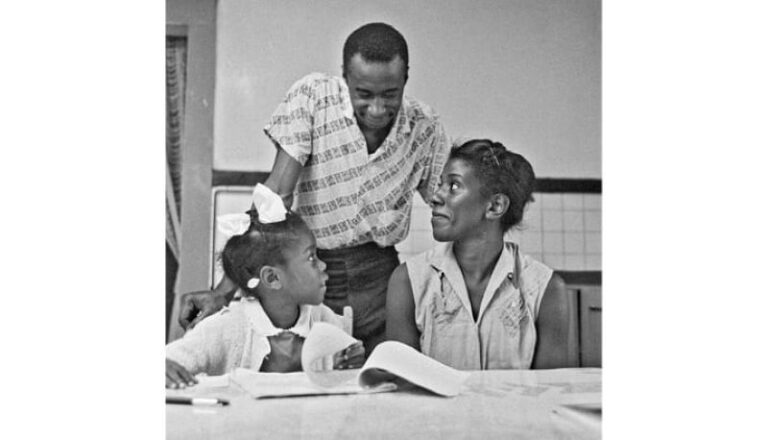When the history of the Civil Rights Movement is told, names like Martin Luther King Jr., Rosa Parks, and Ruby Bridges dominate the headlines. But behind these public figures are countless everyday individuals whose choices shaped history. Among them was Abon Bridges, the devoted father whose unwavering support helped his daughter, Ruby Bridges, become a symbol of courage and change.
Early Life in Segregated Mississippi
Abon Bridges was born on January 20, 1931, in Mississippi, at a time when the South was deeply segregated under Jim Crow laws. African Americans faced systemic discrimination in education, employment, housing, and basic civil rights. From an early age, he experienced the realities of inequality firsthand.
Determined to carve a better life for himself despite these barriers, Abon developed valuable skills as a mechanic. In the rural South of the 1940s and 1950s, good mechanics were always in demand. His reputation for reliability and technical skill earned him respect within his community and provided his family with a stable livelihood.
Building a Family and a Future
In the 1950s, Abon married Lucille Bridges, a woman who shared his values of hard work, perseverance, and hope for a brighter future. The couple went on to raise five children, with their youngest, Ruby, destined to play a historic role in America’s journey toward desegregation.
Life for the Bridges family was far from easy. Abon worked long hours as a mechanic, while Lucille took domestic service jobs to help provide for their children. They faced the challenges of raising a family in an era where racial inequality limited opportunities for African Americans at every turn.
Education was central to their parenting philosophy. Abon and Lucille firmly believed that learning could open doors to a better life, even in the face of systemic racism. This commitment to education set the stage for one of the most significant moments in civil rights history.
The Decision That Changed Everything
In 1954, the Supreme Court’s landmark Brown v. Board of Education ruling declared school segregation unconstitutional. Yet, by 1960, many Southern states, including Louisiana, had done little to integrate schools. That year, federal courts ordered New Orleans to desegregate its public schools.
Ruby Bridges, then just six years old, was chosen to attend the all-white William Frantz Elementary School. For Abon and Lucille, the decision to allow Ruby to integrate the school was not made lightly. They weighed the dangers — the threat of violence, community backlash, and social isolation.
Ultimately, after much discussion and prayer, they chose to move forward. For Abon, it was about more than sending his daughter to school. It was about standing up for justice and helping break down the barriers of segregation.
Facing Backlash and Personal Sacrifice
The reaction was immediate and hostile. Angry white crowds gathered daily outside William Frantz Elementary, hurling insults and threats at Ruby. Federal marshals were assigned to escort her safely into the building.
The Bridges family bore the brunt of this backlash. Neighbors distanced themselves, friends disappeared, and the community they had once been part of turned its back on them. Abon received threatening phone calls at work, and eventually, the controversy cost him his job as a mechanic.
Losing steady employment in the 1960s was devastating, especially for African American men in the segregated South, where good-paying jobs were already scarce. Still, Abon never wavered in his commitment to his family and the cause of equality. His quiet resilience became a source of strength for Ruby during those challenging months.
A Veteran’s Perspective
Abon’s resolve was shaped, in part, by his military service. He was a Korean War veteran, having served his country honorably during a time when African American soldiers faced discrimination both abroad and at home.
Like many Black veterans of his generation, he returned from military service to a society that offered little recognition or respect for his sacrifices. The contrast between risking his life for his country and facing racial prejudice in his own hometown was stark. Yet, these experiences only strengthened his sense of justice and discipline, qualities he carried into his role as a father and community member.
Life Beyond the Headlines
After Ruby’s historic first year at William Frantz Elementary, the Bridges family continued to face challenges. Financial hardship persisted, and the social wounds caused by community hostility took time to heal. Still, they found moments of normalcy, joy, and progress.
While Ruby’s story became a symbol of the Civil Rights Movement — immortalized in Norman Rockwell’s painting The Problem We All Live With — Abon remained largely out of the spotlight. He did not seek fame or recognition, preferring instead to live quietly, supporting his family and working to rebuild stability in their lives.
A Legacy of Strength and Principle
Abon Bridges’ role in civil rights history is often overshadowed by the focus on his daughter’s bravery. Yet his decision to stand firm, even at great personal cost, was a pivotal act of courage. Without his and Lucille’s willingness to take that risk, Ruby’s story — and the progress it inspired — might never have happened.
He demonstrated that leadership in the fight for justice doesn’t always come from the podium or the headlines. Sometimes, it comes from the quiet, steady determination of a parent who refuses to let fear dictate their child’s future.
Remembering an Unsung Hero
Although details about Abon Bridges’ later life and finances remain private, his contributions to civil rights remain part of America’s collective history. He passed away in 2010 at the age of 79, leaving behind a legacy defined not by wealth, but by values and actions that helped shift the course of the nation.
His story is a reminder that progress often depends on the choices of individuals willing to endure hardship for the sake of future generations. Abon Bridges may not have sought recognition, but his steadfastness helped pave the way for a more inclusive and just society.
